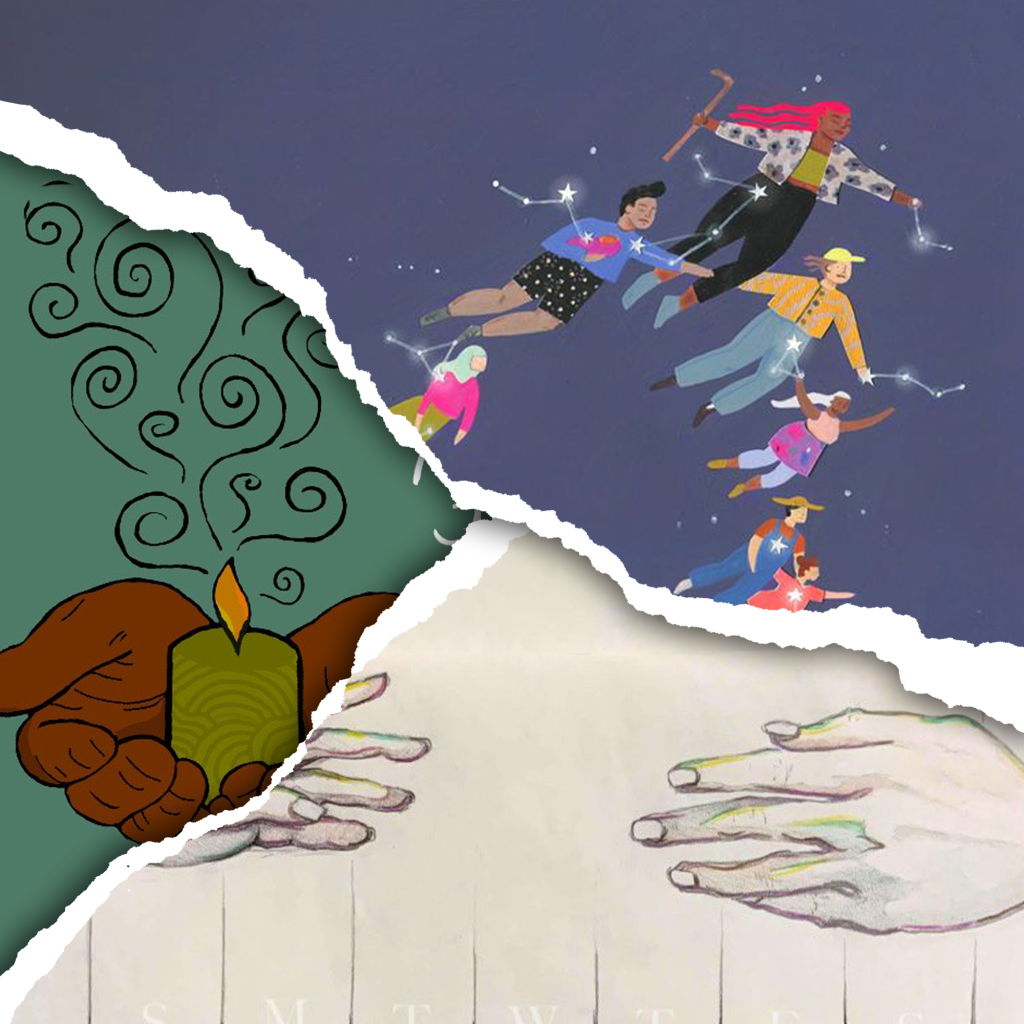
This post is a web version of the zine, “Let This Radicalize You: A COVID Memorial Mixtape.” A visually simplified version of this zine will be mailed to incarcerated people as part of Lifted Voices’ Signs, Shrines, Collages & a Mixtape week of action. You can listen to the mixtape here.
You can find an album that includes an ASL version of the zine and mixtape here.
You can find a version of this zine that can be mailed to incarcerated people here.
Introduction by Kelly Hayes
This zine is composed of speeches that were contributed for “Let This Radicalize You: A COVID Memorial Mixtape,” an effort co-created by the Lifted Voices collective and artist Ric Wilson. As part of the National Week of Mourning for victims of the coronavirus, October 4-11, the Lifted Voices collective organized an event called Signs, Shrines, Collages and a Mixtape: A Remote COVID Vigil. As prison industrial complex abolitionists, we wanted our contribution to this act of collective mourning to honor imprisoned people who have died of the disease. We were joined in this effort by Love & Protect, a collective that supports people criminalized for self-defense, and other allies in the fight against carceral violence. Organizers recorded speeches offered by people who are challenging carceral violence in their work. Chicago organizers like Aislinn Pulley, Benji Hart, Tanuja Jagernauth, Juliana Pino Alcaraz and Kelly Hayes were joined by Bresha Meadows, a formerly incarcerated youth organizer living in Ohio, in creating speeches that paid tribute to the fallen and demanded freedom for the incarcerated.
The mixtape will be played through loudspeakers outside the Metropolitan Correctional Facility in downtown Chicago, during the week of vigils, and possibly at other facilities as well. This zine was created so that imprisoned people and others can access the speeches in their entirety.
Why We’re Doing This
This is a critical moment for people trapped within the walls of the prison industrial complex. People in the U.S. have long been coached and conditioned not to think about the torturous conditions of the prison system, or about what happens to imprisoned people. We are living in a moment when people are being encouraged to keep calm and cooperate with the system, even as conditions rapidly worsen for people the system was already killing. We know the conditions of poverty, imprisonment and housing insecurity make COVID-19 transmission more likely, which means that reducing those conditions would mean less death. But to take such action would undermine this system, so instead, we are witnessing waves of die-offs, where vulnerable people are simply sacrificed.
There is no need for a gas chamber, or a loaded gun, when a disease can be allowed to ravage a confined population. Atrocity has often been waged in this way, across the course of history. In retrospect, we tend to recognize that gas chambers and people dying of typhus in concentration camps are both manifestations of genocide. Yet in the present, we often find ways to justify our silence, complicity and cooperation with atrocity. In this moment of great escalation, we must put that tendency to rest.
We must be honest with ourselves about what is happening. There is no clean disconnect between prison camps and death camps. When people are warehoused in conditions that we know will breed a virus, a decision is being made about what will happen to many of those people. Capitalists, and the death-makers of the prison industrial complex, have always cultivated and maintained conditions that they know will be unsurvivable for many. Prisons house people who have been treated as refuse by this society: people living with addiction, disabled people, impoverished people, mentally ill people and others who are, themselves, often treated like a scourge.
What we are learning now is that disposability is contagious. We have watched as Black communities, Latinx communities, disabled people and elderly people have been cut down by this disease in great numbers. Structural racism and inequality has found a horrid new expression, and the prison system is emblematic of this phenomenon. Andrea Circle Bear, a member of the Cheyenne River Sioux Tribe, died of COVID-19 at the age of 30 in federal custody. Andrea was the first woman in federal custody to die of the coronavirus. She was also pregnant when she fell ill. Her child lives on, but Andrea was lost soon after giving birth.
The Department of Justice had touted Andrea’s sentencing in a January press release as an example of its crackdown on drug offenses. “Don’t let yourself or your property get mixed up in the world of illegal drugs. It ends badly,” said U.S. Attorney Ron Parsons.
There is a reason our collective grief has been suppressed with lies and political circus acts during this pandemic. It’s because there is power in solidarity and collective memorialization, and the powerful are afraid of that empathy and solidarity. This pandemic, like the horrors of the prison system, has demonstrated how harmful it is to human beings to be deprived of connection. We were already being starved of it by the cult of individualism.
The answer is more empathy and connection. The answer is to become an immovable force when we are together and a constellation of power and empathy when we are apart.
History does not simply happen to people. We all make choices. We must ask ourselves, what do we owe to the living, and what do we owe to the dead?
With these words we extend our love and solidarity to imprisoned people and to everyone who is struggling with isolation, loneliness and grief. May we all grieve together.
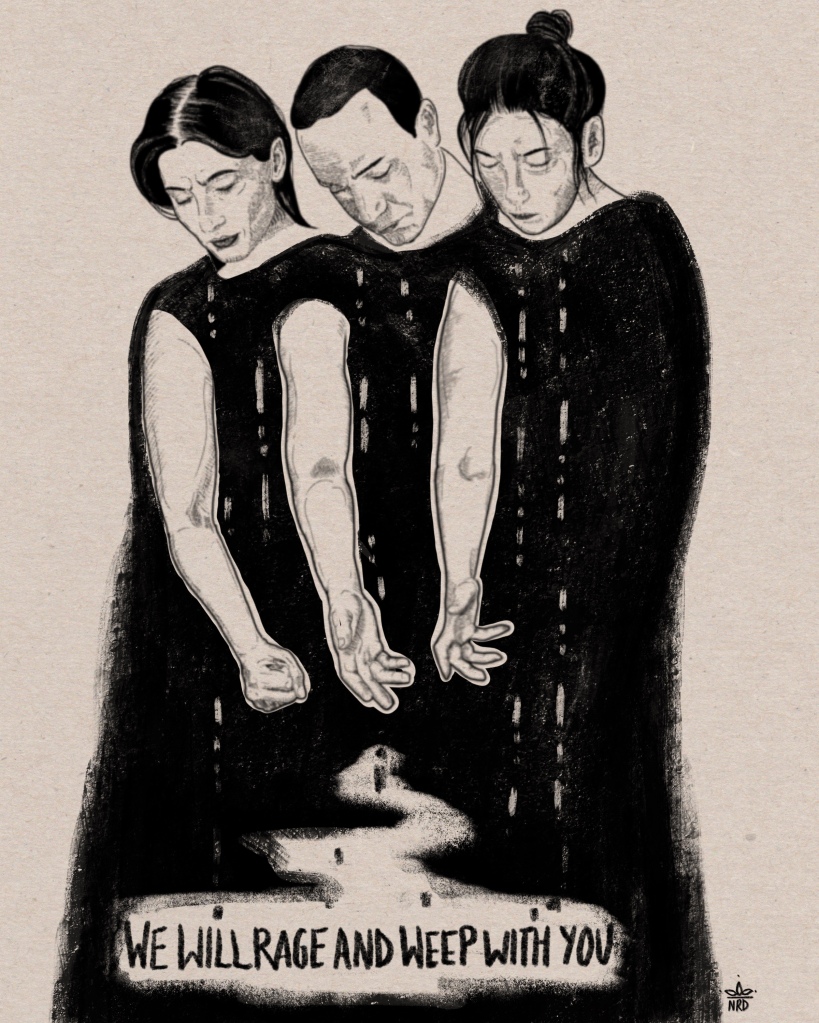
Juliana’s Speech
My name is Juliana Pino Alcaraz, I’m a Colombiana Afroindígena Wayuu and Bari who is here as an abolitionist in the environmental justice movement in Chicago. My words that follow are in response to how state violence is driving deaths and lying to us about what we know we’re facing from COVID, a respiratory illness whose transmission is made severely worse by air pollution, incarceration, and anti-Black racism, representing hundreds of thousands of community members lost. Community members we are here to collectively remember.
You/We bled in water: they don’t even try to pretend you are/were alive.
They will tell you a simple story, full of tall tales about your worthlessness, and they will call it the medicine you actually deserve. They will supply you expired food, and say you earned an expiration date. They will poison your person with exposure to the slow violence of pollution and pandemic, and ask you why you can’t breathe? They will fill their reports with myths of Black danger, justified Native genocide, and friendly evictions. They will claim that cops keep us safe, that the companies imploding toxic clouds into the chests of abuelas really had our best interests at heart.
They will dare to call this correct.
We will reach deeply into the empathetic earth, to the place where Black lives matter and indigenous spirits thrive and Brown people rejoice, where we all receive our fire from this planet and the seed of our food is nourished, and we will tell the truth. We will rage aloud that air quality indoors is five times worse outside than inside the cages in which they trap you, our families, and this is the air you are breathing. We will tell them that Personal Protective Equipment requires being treated like a person in the first place, with a filter dignifying your face to shield you and your people from the toxic, viral disregard disintegrating your lungs. We will follow the lead of youth to defend their futures and protect the water from all of their deadly pipelines. We will battle back the abusive attempts to disappear your humanity inside of assaults, numbers, murders, and statistics. We will labor to heal with and protect each other in spite of all of this, and,
We will dare to tear these systems apart.
Perceive me now: the walls of this place WILL crumble and the land returned by the foundation-shaking, system-ending strength of our bonds to each other.
Angela Davis once said, “we have learned to forget about prisons.” We pledge to you that we do not believe their simple stories, and we will not forget. Because try as they might, these bars cannot keep us from destroying their assets and building our reality back up together. We are energized by your sounds of solidarity for Black lives, we love you, and we love all souls we have lost. We will correct the record: YOU are worthy, YOU are our community, WE are worthy, WE are our community, and WE all grieve together.
Together, we transform water dripping with poisonous particles.
Together, we clear the air, thick with pollution, COVID, and lies.
Together, we honor the soil ground down with waste of industry and the bones of ancestors.
Together, we remember the souls snatched away from our family, always too soon.
Together, we turn chains to dust, returning the minerals in steel and concrete to the plants.
Together, we rest in community without being disposed of in our own beds.
Together, we rise to deprive the monster of its simple story, and replace it with our own.
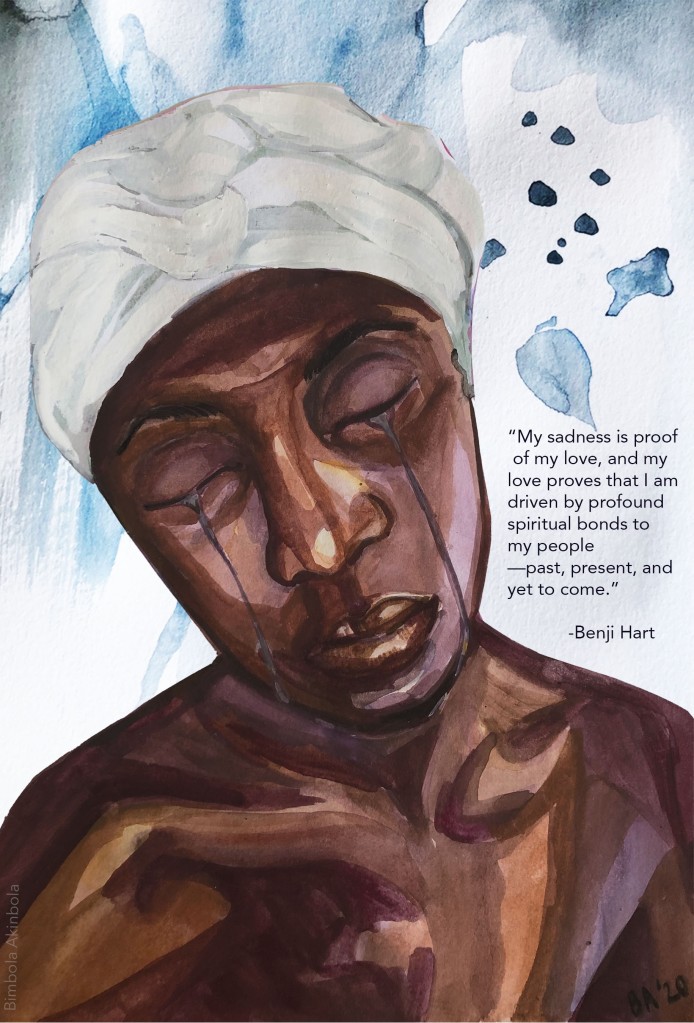
Benji’s Speech
My name is Benji Hart. I’m an author, artist and educator, currently living in Chicago, and I would like to offer up, by way of mourning, and by way of grieving, love to the people who we’ve lost to COVID, particularly, folks in the mass incarceration system, including detention centers. And I also want to offer up grief for all the lessons that COVID has attempted to teach us, that we haven’t heeded, but that we’ve also been discouraged from heeding by the current administration and by the ruling class. COVID sent us such strong messages about how connected we all are. COVID has taught us so much about the meaningless categories that we divide our society up by — folks on the inside folks, on the outside, folks with healthcare, folks without healthcare, folks with citizenship, folks without citizenship — and that in actuality, when there’s a pandemic, you can’t make those distinctions. If a pandemic is allowed to happen in one population, it impacts all of us. If certain parts of the population don’t have healthcare, we can’t actually control a disease like COVID-19.
And instead of us slowing down, instead of us backing off of the ways that we were harming the environment, instead of us really devoting ourselves, committing ourselves to making universal healthcare a reality, to getting people out of cages, to opening borders, so that people could actually move freely as they needed to, and share resources with each other as they needed to, we’ve done the exact opposite. And so many of the people we’ve lost, it’s because we haven’t heeded the lessons, the teachings, that COVID really has tried so hard to impart on us. So I grieve for both of those things. I grieve for the opportunities for learning, for transformation of our society and of ourselves that we so briefly, and so closely, almost attained, and we’re quickly discouraged from doing so by folks in power by the federal government, by folks with money and resources who were willing to sacrifice young people, Black people, Indigenous people, undocumented people, Incarcerated people so that they didn’t lose a profit, and so that the economy continued to generate the inequities and the environmental catastrophe that it has always been generating.
I mourn for the ways we haven’t learned this year, that we should have, that I wish we collectively did. And I offer up a prayer to those we’ve lost, to their grieving families, and also to a future where we do learn the lessons, where we fight for each other collectively, and don’t sacrifice our neighbors, don’t sacrifice the most marginalized among us to a pandemic, whether that pandemic is COVID or whether that pandemic is capitalism, whether that pandemic is the police prison and military system, whether that pandemic is white supremacy and white nationalism, I dream of a day, and pray for a day, where we learn to see each other as part of one collective and fight for collective liberation.
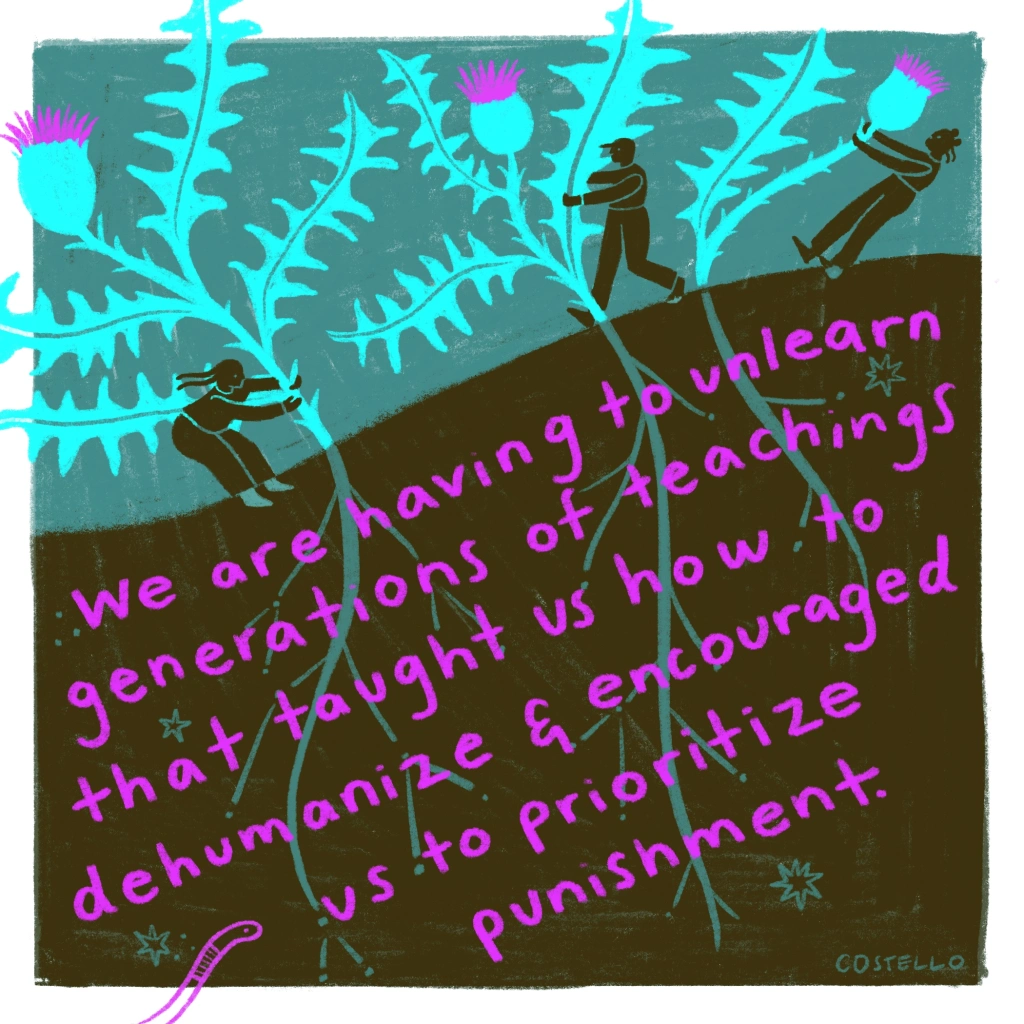
Bresha’s Speech
I am Bresha Meadows, a member of Lifted Voices. I was once incarcerated for an act of self defense. Today, we honor those we have lost to COVID-19, including many counted and uncounted deaths that have occurred behind prison walls. Having been in jail, I know the everyday worry, and adding a virus, one that has taken many lives can make it almost impossible to want to keep going. Although jail is supposed to be a place for punishment to hold someone where they are getting more and more sick is almost the same as the death penalty itself. A good friend of mine has a dad in jail and he has also been diagnosed with COVID, but they have little to nothing to help him. Seeing how this affected her and her family has brought me to the realization that prisons are treating this virus as nothing more than a common cold.
I’m lucky enough to have gotten out and I try to do everything most people wouldn’t expect me to do. I go to classes at Cleveland State University, I’ve got my own apartment. I have become a part of Lifted Voices and I found that I also want to help others get free. We can’t leave people behind who were already being left behind. We can’t do what we’ve always done. We can’t allow what happens to people to mean less to us over time. Whether people live or die, it has to matter more and more to us, not less. We cannot help people. If we forget them, we cannot help ourselves if we give up on people. We are not giving up on people in jails and prisons or detention centers. We are not giving up our hope.
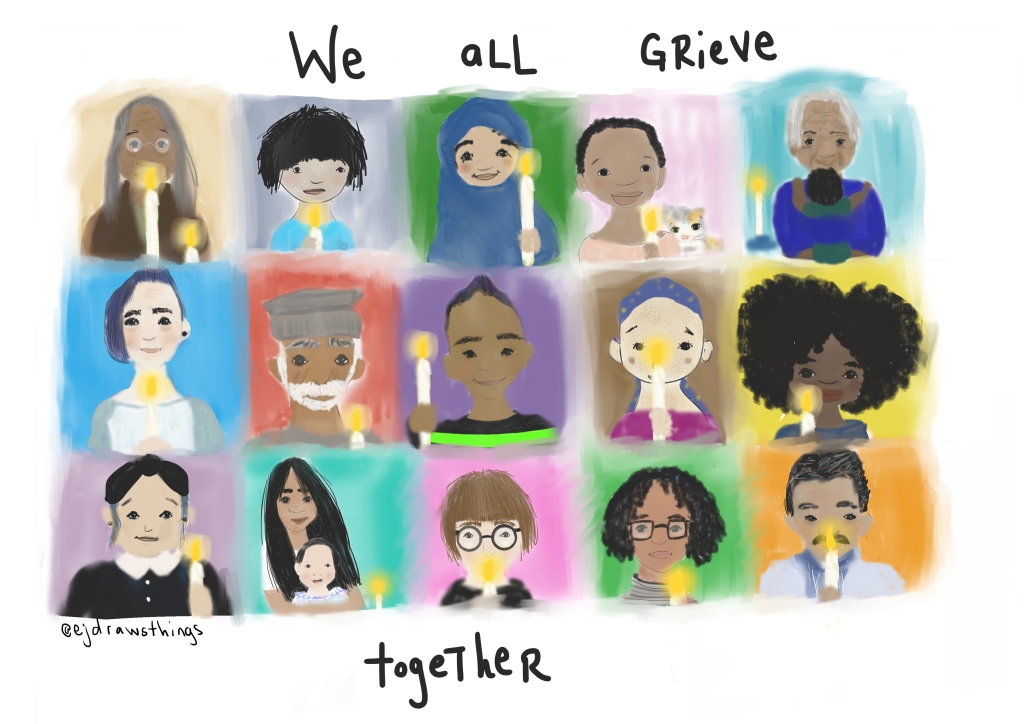
Tanuja’s Speech
My name is Tanuja Devi Jagernauth, and I am honored to contribute to this mixtape on behalf of the Mutual Aid Mourning and Healing Project. We are a diverse group of folks who came together in March of 2020, connected by a shared understanding that, one, collectively devastating times call for collective methods of healing and, two, no one should have to grieve alone. We are also connected by a drive to politicize what is often shrugged off as “private” or “personal.”
Every single death due to COVID-19 is as political as it is personal. Every single death implicates Donald Trump, a fascist who continues to spread lies and misinformation about the severity and impact of the pandemic.
However, wherever this finds you, please know: your life matters to us
and if this moment finds you holding the pain of loss
I want to humbly offer a moment
to hold it with you.
For the loss that is fresh, hot – an open wound,
For the loss that is so old you can’t remember which lifetime – or whose – it came from
For the loss you cannot name yet
For the loss of a friend
For the loss of a lover
For the loss of family
For the loss of home
We mourn and rage with you.
And inside our grief, wherever it might live in our bodies,
However it feels today,
May we find that thing – anything – that can move.
May we find that thing we can touch, pick up,
and roll around in our hands
like a perfect ball of clay,
heavy and cool to the touch.
May we find its potential
and use it to build the next world together.
Cindy Milstein writes in Rebellious Mourning, “Our grief can open up cracks in the wall of the system. It can pry open spaces of contestation and reconstruction, intervulnerability and strength, empathy and solidarity.”
Through our mutual aid work we are learning to let go of our privatized selves. We are learning to connect our personal needs for survival, safety, healing, and community to people around us who we once considered strangers.
We are learning how to ask for help, and we are learning how to receive it.
We are learning the critical difference between harm and accountability.
We are learning that we have all we need, and we are finally admitting that we are all we’ve got.
Slowly but surely, with care and intention, we are co-creating the next world.
Until it comes we will continue to love each other out loud.
We will continue to rage and weep together.
We will continue our riot of empathy.
Our bonds make us powerful
and that scares the shit out of Trump
because at the end of the day he knows
there are more of us than them.
There are more of us than them.
There are more of us than them.
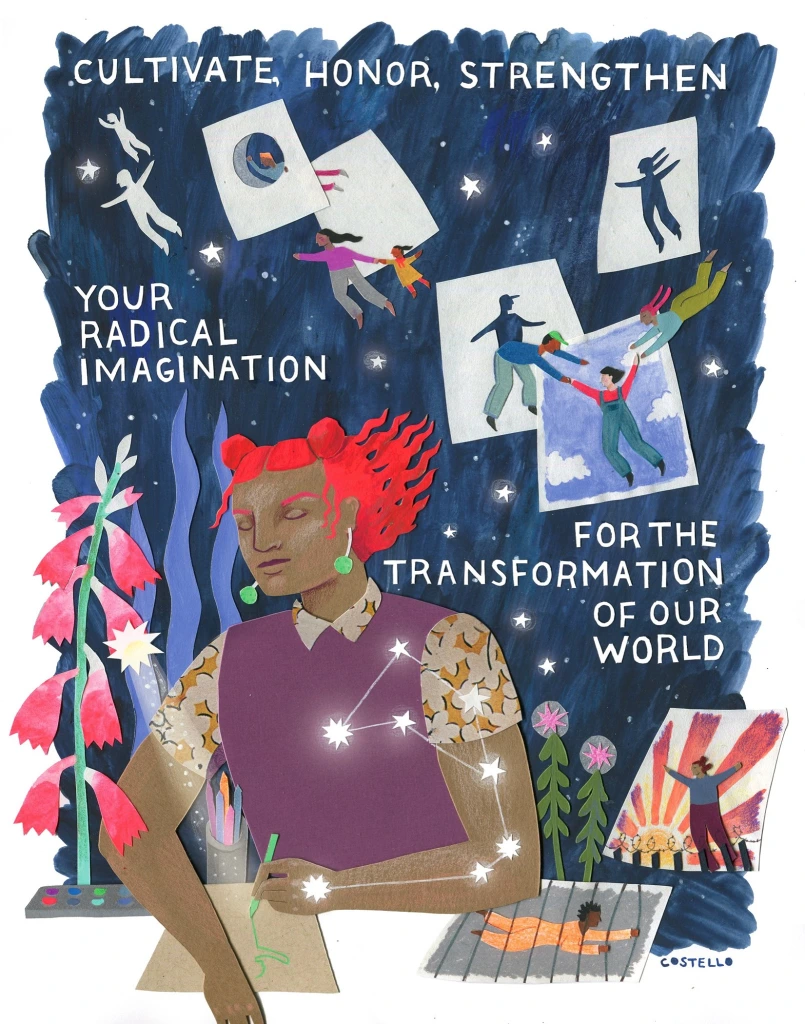
Aislinn’s Speech
I am Aislinn Pulley. I am the co-executive director of the Chicago Torture Justice Center, co-founder of BLMChi, and a board member of Ujimaa Medics. I am a long time organizer, an artist, born and raised in Chicago.
I have known so many people who have been affected by COVID. I have known people who they themselves, have lived through, suffered through the virus. People who have succumbed to death. The disproportionate number of people of color and specifically Black, Indigenous and Latinx people who have died from this virus is unconscionable. Black, Indigenous, Pacific Islander and Latinx people all have COVID-19 death rates that are roughly triple or more White people in the United States. In a country who has historic wealth, amassed at the detriment of services needed in our communities, the example of how COVID is disproportionately affecting the poor is unconscionable. This is a country that has amassed the richest resources in the world and yet uses them to incarcerate, torture and kill its populace. We must dismantle this system, we must create a system that is built on sustaining life and ensuring our livelihoods.
COVID has proven how necessary this is and that the time is now. We can no longer wait. We have to dismantle, we have to upend, we have to create new. It has never been clearer that it is this system that is causing unnecessary deaths. It is incumbent upon us to act.
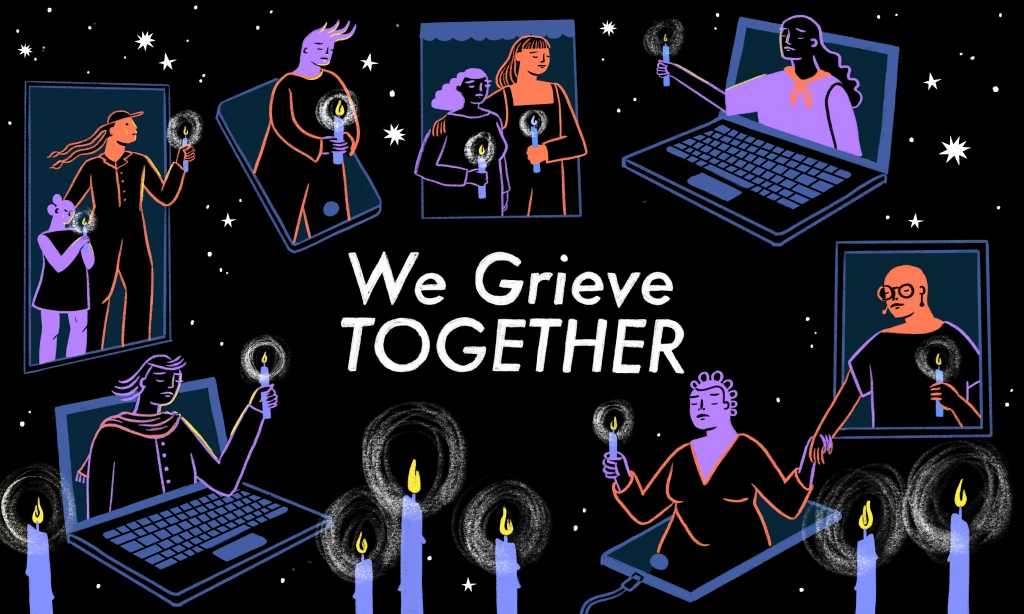
Artwork: Molly Costello
Kelly’s Speech
My name is Kelly Hayes. I am a Native writer and a prison abolitionist, organizing in Chicago, Illinois. Over 950,000 people have died of COVID-19 worldwide. More than 200,000 deaths have been attributed to COVID-19 in the United States, but we know the real number is much higher. We know that even before COVID-19, imprisoned people were experiencing conditions that were stripping away years of their lives, robbing them of both the present and the future. For many people living in cages, and outside of them, survival was already a daily struggle. And now, as winter approaches, we know that greater atrocities are close at hand. We know that COVID-19 is already tearing its way through jails, prisons and detention centers, striking people who already had no functional access to healthcare. The results have been devastating. Now with flu season upon us, people will suffer and die in even greater numbers, unless we get them out.
Freeing imprisoned people may seem too radical an aspiration for some people right now. The election has given people a whiff of hope that the system might yet save them, and while it is possible to reduce the damage done, we are staring down mass death, nationwide evictions, financial collapse, and even the potential collapse of our profit-based healthcare system. In a time of crisis, capitalism will always cut its losses, as needed, to survive. It has done so by way of the prison industrial complex for a very long time. People who do not fit neatly into society, psychologically, economically or otherwise, are disposed of. Some die, and some are simply stuffed into containers. Disabled people and the elderly are similarly discarded and contained in the U.S., which is why we have seen so many retirement homes and assisted living facilities ravaged by this disease. No plan was made to safeguard these people. They were never an economic or social priority, so they were disposed of.
The system will have to dispose of more and more of us to sustain itself, in the coming years. This is a time of collapse, and also of possibility. We cannot afford to be meek or passive or to allow history to simply happen to us. Rather than shrinking away from our imprisoned siblings, out of some misguided fear of rocking the boat, we should be rejecting the continued expansion of a carceral state that threatens to swallow so many of us in the years to come.
This society wants us to believe that our fates are our own — that by abandoning one another, we can keep ourselves safe, individually. But what will happen to us, to our neighbors, to our families, as jobs continue to evaporate, and mass eviction and displacement play out across the country? Where will we be contained? In poverty districts that we are not allowed to leave? Will we be surveilled, and criminalized and monitored by ankle bracelets? That dystopian framework does not have to be invented. It is here. Growing and grinding people under. It is the sprawling prison industrial complex that not only keeps people locked in prisons but that has also outsourced imprisonment into our own homes.
COVID-19 is a genocidal weapon in the hands of this government, but it will also knock on many doors at random in the months to come. If we organize, our collective pain can become collective empathy and action. But this will not happen on its own, as a result of social deterioration. It will take political will, compassion and courage. Whatever is ahead, our survival will depend on our willingness to organize it, and our freedom will depend on our willingness to fight for each other — and that means fighting for our imprisoned siblings.
There is a reason they don’t want us to grieve together. Because they know we will be more powerful if we do.
May the fallen rest in peace, and may the rest of us raise hell.
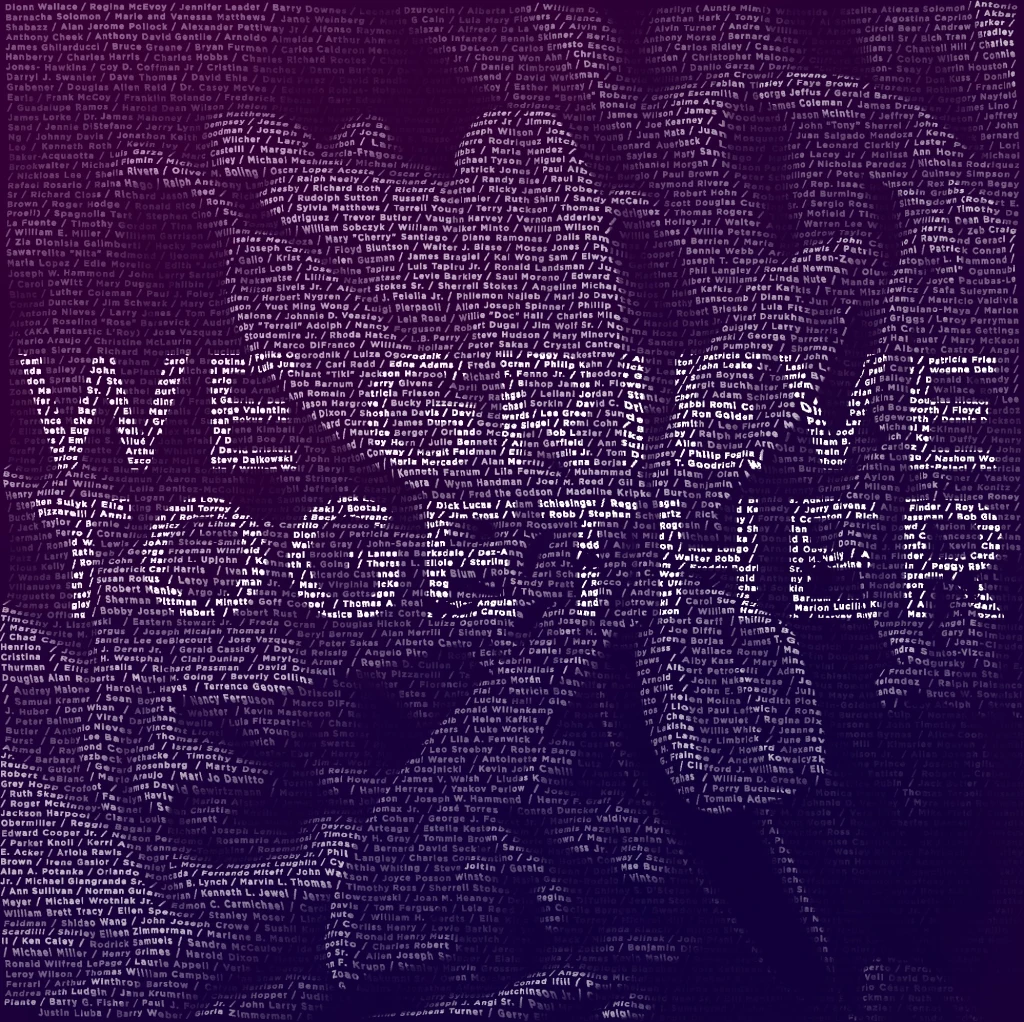
This image features the names of 1,000 people who have been lost to COVID-19, including people who died while imprisoned.
“Settle your quarrels, come together, understand the reality of our situation, understand that fascism is already here, that people are already dying who could be saved, that generations more will live poor butchered half-lives if you fail to act. Do what must be done, discover your humanity and your love in revolution.” – George L. Jackson
“Let this radicalize you rather than lead you to despair.” – Mariame Kaba
This effort has been organized by the Lifted Voices collective.
The audio mixtape that includes the speeches featured in this zine was mixed by Ric Wilson with instrumentation from tobi taiwo.
Cosponsoring Organizations
Love & Protect
Moms United Against Violence and Mass Incarceration
Project NIA
Contributing Artists
Molly Costello
Bimbola Akinbola
Erin Johnson
Nicole Renee
Mairead Case
Mugsie Pike